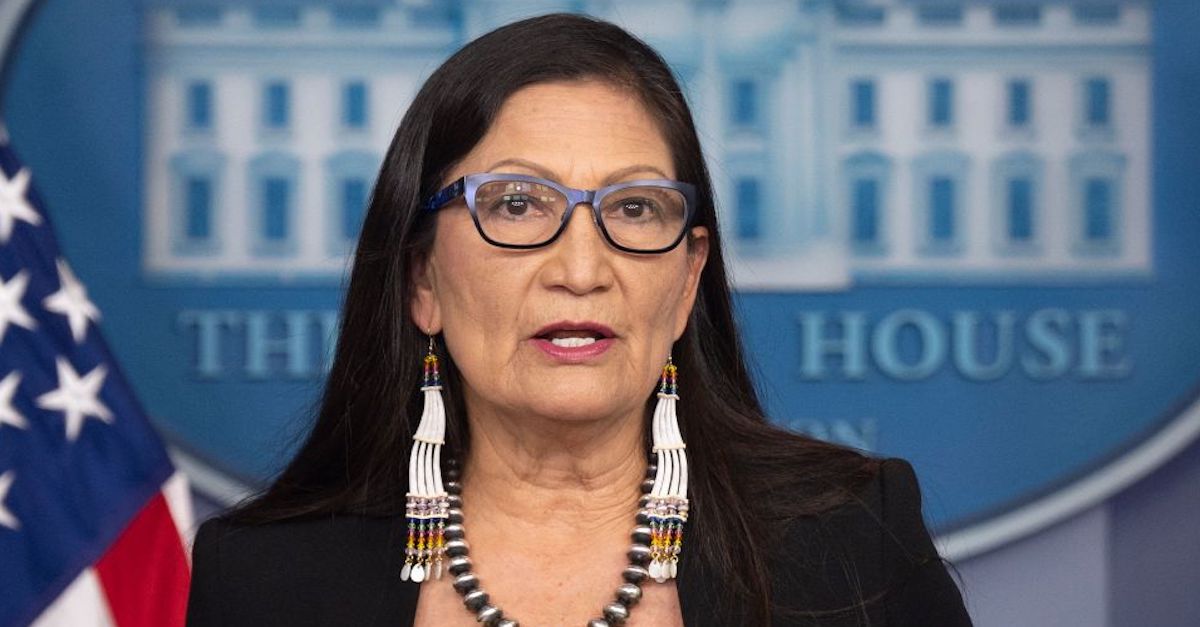
US Secretary of the Interior Deb Haaland speaks during the daily press briefing at the White House in Washington, DC, on April 23, 2021. (Photo by JIM WATSON / AFP) (Photo by JIM WATSON/AFP via Getty Images)
The Supreme Court has agreed to hear arguments in four cases challenging the constitutionality of a decades-old federal law aimed at protecting Native American children.
The Court granted certiorari Monday in Brackeen v. Haaland, consolidating it with three other cases: Haaland v. Brackeen, Cherokee Nation v. Brackeen, and Texas v. Haaland.
“The petitions for writs of certiorari are granted,” the Court said in its order Monday, adding that the cases will be consolidated going forward. The Court limited oral argument to a total of one hour and set a briefing schedule for the parties.
All four cases stem from efforts by Chad Brackeen and Jennifer Brackeen, a Texas couple, to adopt a Navajo child. The Brackeens, who are white evangelical Christians and not Native American, had sought to adopt the boy, who was placed in their care in 2016 when he was 10 months old. When they tried to adopt him the following year, a court ruled that under the Indian Child Welfare Act of 1978 (ICWA), the child must be sent to a Navajo family to whom he was not related.
The Brackeens filed a lawsuit challenging ICWA. They argue that the law, originally passed to protect Native American children after studies showed that a number of them were being placed in non-Native American homes despite relatives being willing to take them in, violates their constitutional right to Equal Protection.
“ICWA operates as a unified scheme that places ‘Indian child[ren]’ in a disfavored position, depriving them of a placement decision based on their best interests, and instead requiring placements based on the child’s ‘biolog[y],'” the Brackeens argue in their certiorari request. “These ‘requirements often lead to different outcomes than would result under state law,’ because state law asks what placement would serve the child’s best interests—not what placement would place the child in the ‘Indian community [citations omitted.].'”
The Brackeens argue that ICWA’s preference to place Native American children into Native American homes “disadvantages vulnerable children because of their ancestry—even if they have no other connection to the tribe—making it more difficult for those children to find permanent, loving homes.”
Their petition accuses Congress of blatant racial discrimination against non-Native American families looking to adopt Native American children.
“To be sure, Congress’s racial discrimination is ‘most evident’ in ICWA’s third placement preference, which bluntly favors any ‘Indian famil[y]’ from any of 574 tribes over any non-Indian family,” the Brackeen’s petition says. “But the third placement preference is simply the smoking gun demonstrating beyond peradventure that the entire scheme violates equal protection. The placement preferences collectively establish an impermissible ‘naked preference for Indian over non-Indian families’ [citations omitted].”
U.S. Interior Secretary Deb Haaland—the first Native American person to hold a cabinet secretary position—said that the legal classification of someone as Native American is a political determination, and not a racial one, and therefore an Equal Protection analysis wouldn’t apply.
“On the merits of the plaintiffs’ equal protection claims, a majority of the en banc court of appeals held that ICWA’s Indian-based classifications are political, not racial, classifications and are thus subject to rational basis review,” Haaland’s brief said, referring to the U.S. Court of Appeals for the Fifth Circuit decision that was split on the constitutionality of ICWA. “The majority then upheld the constitutionality of ICWA’s definition of ‘Indian child,’ finding it to be ‘rationally linked to the trust relationship between the tribes and the federal government, as well as to furthering tribal sovereignty and self-government.'”
Haaland said that ICWA advances the government’s “substantial interests in the welfare of Indian children and their parents, the integrity of Indian families, and ‘the stability and security of Indian tribes.'”
“[T]he federal government has a sound interest in ‘protect[ing] the best interests of Indian children’ by promoting the placement of those children in settings that are most likely to foster a connection with their Indian tribes and culture,” Haaland argued, adding that many tribes are located near each other and “have a common history, and share linguistic, cultural, and religious traditions.”
The Brackeens also argued that ICWA improperly “commandeers” states to follow federal adoption rules in violation of the 10th Amendment.
“ICWA trenches upon state authority in two independent ways: It exceeds Congress’s enumerated powers and commandeers States to carry out a federal statutory regime,” the Brackeens said in their brief.
“[T]he anticommandeering doctrine prevents Congress from foisting onto States the obligation to implement a federal statutory regime,” the Brackeens also argued. “When Congress regulates, ‘it must do so directly; it may not conscript state governments as its agents.’ But ICWA commands States to follow Congress’s preferred child placement preferences ‘under State law’ in state child-custody proceedings.”
According to Haaland, however, ICWA only affects the courts, and not private or state agencies, and therefore an anti-commandeering analysis isn’t appropriate.
“[C]ongress does not violate the anticommandeering doctrine when it enacts a law that ‘imposes restrictions or confers rights on private actors,'” Haaland argued, later adding: “Because a law that applies evenhandedly to state and private actors cannot be understood as conscripting state officers into federal service, the ‘anticommandeering doctrine does not apply.'”
Other non-Native American families that have tried to adopt Native American children have also joined the Brackeens’ lawsuit.
[Image via Jim Watson/AFP via Getty Images.]